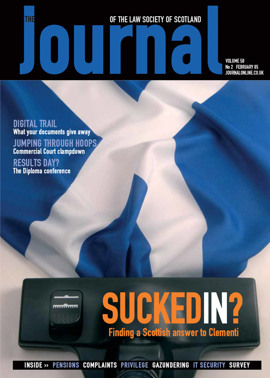Cracking the conflict code
Opus Dei has hit the headlines of late, not just as a result of the bestselling novel The Da Vinci Code, but also because the Education Secretary, Ruth Kelly, has been forced to defend her involvement with the movement, and reject suggestions that her religious beliefs would impact on her ability to carry out her government role.
This interplay between an employee’s private and work activities can be a difficult one to manage, particularly where the conduct of an employee outside work is seen to impinge on their performance. Of course, the Employment Equality (Religion or Belief) Regulations came into force in 2003 and could be put to use by any employee who found themselves denied promotion opportunities or marginalised because of their religious beliefs. However, a certain other set of employee beliefs is proving more difficult to deal with.
The buildup to a general election is gathering momentum and inevitably, over the coming months, the political activities of employees will be brought sharply into focus. Many will have read about the case of Lee v ASLEF, which involved a train driver expelled from the union after his membership and activities on behalf of the British National Party became known to ASLEF officials. The union expressed the view that its members’ freedom to associate would be infringed by Mr Lee’s continued membership, as they would be forced to associate with someone whose beliefs they deplored. However, to the dismay of many, his claim of unlawful expulsion was successful at tribunal in October.
Legislation has now been enacted which will prevent a repetition of the Lee case. The amendments to the Trade Union and Labour Relations (Consolidation) Act 1992, by the Employment Relations Act 2004, were brought into force on 31 December 2004. These make it clear that trade unions are entitled to exclude an individual wholly or mainly for taking part in the activities of a political party which are contrary to its own rules and objectives.
Action is also being taken in other quarters. The Association of Chief Police Officers, for example, has recently introduced a policy whereby no member of the police service in England and Wales, whether officer or staff, may be a member of an organisation whose constitution, aims, objectives or pronouncements contradict the general duty to promote race equality.
So, how far can employers go in seeking to restrict an employee’s external activities? A disciplinary procedure can of course provide for sanctions where an employee fails to meet the organisation’s standards of conduct whether during working hours or not. However, the seriousness of what the employee has done and what effect it has had will then need to be considered when deciding which sanction is appropriate.
For example, would an employer be justified in dismissing an employee for passive membership of the BNP, or only in taking action where it felt the employee’s activities were questionable? Mr Lee, for example, was engaged in activities such as leafleting, conducting harassment campaigns against Anti-Nazi League members and regularly submitting copy to a fascist magazine. An employment tribunal has previously held that the dismissal of a BNP member was unfair because the employer failed to establish that his political activities affected his ability to carry out his job. In that case, the individual was employed as a caretaker on a multi-racial housing estate.
Consideration therefore has to be given to the ability and suitability of the individual concerned to carry on doing the job for which they were employed. If this is not felt to be feasible, a transfer to a different area of the business might prove a viable alternative to dismissal.
However, an employee dismissed in such circumstances who is taking their case to an employment tribunal will know that human rights points must be considered. The right to a private life, or the rights to freedom of expression or association are likely to be raised. A human rights challenge was brought recently by a BNP organiser. He had been convicted of causing alarm or offence under the Public Order Act after displaying a poster in his window with the slogan “Islam out of Britain” and featuring graphic references to 9/11. In this case the court held that his right to freedom of expression had not been infringed since it was proportionate in these circumstances that it be curtailed in order to protect the public interest.
The mixed messages from the cases above go to show what a difficult area this will be for employers. There will be an inherent conflict between their own rights, those of the employee(s) in question and perhaps those of service users/clients in the wider community. Clear guidelines as to what is and is not acceptable behaviour will go some way to protecting an employer’s interests and minimise the risk of a costly compensation payout.
Jane Fraser, Head of Employment, Pensions and Benefits at Maclay Murray & Spens
In this issue
- Sell or transfer? (1)
- Promoting competition or competitiveness?
- Promoting competitiveness or competition?
- Not the final word
- Challenge of the FSA
- The pull of the south
- A world of change
- Finding the path
- An elusive model?
- Bank on it
- Trouble at t'mill
- Hidden evidence
- Money claims on behalf of children
- Secure connections
- Tread carefully
- Sell or transfer?
- Cracking the conflict code
- X Factor for success?
- Scottish Solicitors' Discipline Tribunal
- Website reviews
- Book reviews
- Is "gazundering" always bad?
- Defining the guideline






